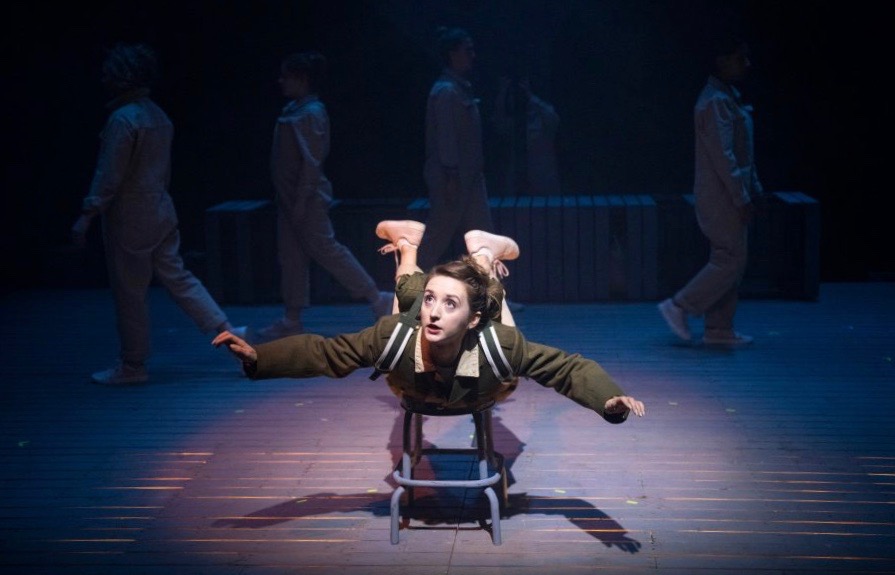
As a director, Amiel Gladstone creates arresting stage pictures in Three Winters (Photo of Julie Siedlanowska by Emily Cooper)
There seem to be at least a couple of good stories in the source material for Three Winters, but writer and director Amiel Gladstone hasn’t figured out how to tell them.
Gladstone based Three Winters on his grandfather’s memories of being a prisoner of war in Stalag Luft III, the camp where the breakout happened that was dramatized in the 1963 movie The Great Escape. Apparently, those prisoners also performed plays using scripts supplied by the Red Cross.
In Three Winters, the narrative lines about the escape and the performances overlap and compete for space, but neither is developed in a satisfying way.
A huge part of the problem is focus. A character named Len, who was inspired by Gladstone’s grandfather, appears in both storylines, but he’s not a strong protagonist in either—and neither is anybody else. In the escape plot, Len is one of the guys who disperses the sand that’s being dug out. That makes him a minor player in the action. And, because he’s not pursuing a strong objective, he’s a weak dramatic figure: Len is so claustrophobic that he doesn’t even want to escape through the tunnel. So what does he want? Beats me. And who’s driving this story? Nobody. A character named Roger is in charge, but we never really get to know Roger. So this plotline has no centre.
Len doesn’t propel the theatre-making narrative either. He’s just there, taking minor roles. Len’s friend George is, arguably, at the heart of the art-making story—more about George in minute—but Len still gets a lot of stage time and it’s never well shaped. Because Gladstone hasn’t given the character any passionate needs or desires, he’s just kind of a blur. Yes, Len, who’s a pilot, feels guilty about his crew members, who all died when their plane went down, but his guilt doesn’t motivate any meaningful action.
Okay, about George, who has the potential to be interesting: in the plays the men perform, George takes the female leads. He’s good at it and he likes it. The implication is that George is gay. He’s even asked to use his woman-like wiles to further the escape plot. And several times, the script refers to the idea that George might be freer to be himself inside the barbed wire than in the outside world, which is provocative. But all of the ideas that are swirling around this character are left maddeningly vague and undeveloped. Is George actually having sex with anybody or enjoying romance? If not, what makes him so goddamn free—the opportunity to perform female roles? Okay, then how safe would that be exactly? My understanding is that there was a loosening of sexual restrictions in POW camps, but there was also significant homophobia. But Gladstone doesn’t get deeply into any of that. His George remains a safely vague and theoretical homosexual.
Now might be a good time to mention that Gladstone has cast an entirely female company to perform his all-male script. A note in the program says that, “Three Winters asks audiences to question their assumptions about who we allow to play what parts and why.” Fair enough, but George is the clear embodiment of that inquiry and, as I’ve just argued, that characterization is shallow—so the inquiry and the convention fall flat. (To be clear: I’m talking about the writing here, not the performances, which are strong.)
In his director’s note, Gladstone also talks about how POWs used theatre making as means of survival. And, in Three Winters, he lets us see the pleasure that George and an actor named Arthur feel when performing. But I got little sense of a meaningful practice. We don’t get to know the characters well and, because we just see snippets from a handful of projects, there’s no sense of a sustained endeavour.
There are too many fruitless tangents in the script—a generic fantasy in which an airman dreams about the woman he’ll marry, for instance. And the playmaking storyline simply co-exists with the escape storyline: neither feeds the other.
But it’s all well performed. Camille Legg is charming as Arthur, the naïve thespian. Acting out one of his roles, Arthur delivers a series of sighs that Legg, impressively, makes hilarious. Julie Siedlanowska brings credible weight to Len’s grief. And Olivia Hutt endows George with a sense of mystery. As a viewer, I didn’t always know what was going on inside of George, but I was always confident that Hutt was plumbing depths. The entire cast delivers.
Adrian Muir’s set is elegantly simple and effective: a long rectangular box at the centre becomes everything from a Hercules airplane to the cramped escape route.
And Gladstone shines most strongly as a director, creating arresting rhythms and stage pictures: having ejected from his plane before being captured, Len floats through the air; when a prisoner commits suicide, he raises his arms once like wings and is briefly illuminated.
I just wish that Gladstone had figured out what story he wanted to tell and how to make that story meaningful.
THREE WINTERS By Amiel Gladstone. Directed by Amiel Gladstone. Produced by Amiel Gladstone and presented by The Cultch. In The Cultch’s Historic Theatre on Thursday, November 8. Continues until November 17.Tickets.
NEVER MISS A REVIEW: To get links to my reviews plus the best of international theatre coverage, sign up for FRESH SHEET, my free weekly e-newsletter.
And, if you want to keep independent criticism alive in Vancouver, check out my Patreon page. Newspapers are dying and arts journalism is often the first thing they cut. Fight back!





0 Comments